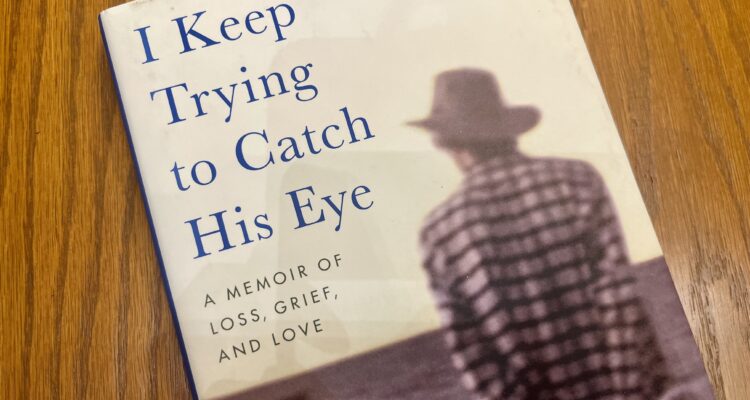The Regina A. Quick Center for The Arts welcomed author Ivan Maisel on Tuesday, March 28 to speak about his book “I Keep Trying to Catch His Eye: A Memoir of Loss, Grief and Love”.
The heartwrenching and honest story shares Maisel’s experience following the suicide of his son Max, as each chapter reveals the rollercoaster of recovery, grief and love.
The memoir was chosen as the 2023 Fairfield Public Library’s annual “One Book One Town” initiative, a program that hopes to foster conversations within the community. And, Maisel’s story is the first book chosen that was written by a Fairfield resident.
Scott Jarzombek, a Fairfield librarian, introduced the night as the “most anticipated event” of the year and noted that “conversations are an essential part of One Book, One Town.”
Maisel, who is not only the book’s author, also comes with a highly decorated past with writing as he served as Vice President, editorial and senior writer at on3.com, a senior writer for ESPN, an editor at large for ESPN college football 105 and more.
He was interviewed by Armen Keteyian, who also has a hefty career in print and broadcast, as he was a lead correspondent for 60-minute Sports, CBS News, CBS Sports, ABC News and more. Maisel and Keteyian met while working at Sports Illustrated, and have been friends since.
Keteyian started the night by asking Maisel the story behind “I Keep Trying to Catch His Eye”. More specially, why he wrote it and how it helped him deal with his grief.
“I best communicate by typing,” Maisel explained. “I’m much better at getting out my feelings than speaking. I would wake up at 4 a.m., pour my heart out and go back to bed. [I] did that for over a year.”
Maisel continued by stating that this routine was what determined how exactly a healing process worked and what it consisted of. In the end, he hoped that his writing would pinpoint what was helpful and what was not so helpful throughout this period because if people haven’t already gone through a tragedy like this, they will inevitably grieve in the future as death is unavoidable.
On the other hand, Maisel was quick to note that everyone grieves differently. “All grief is personal, all grief is individual. Grief is the purest form of love to someone who is no longer here to express that back.”
Luckily, Maisel was able to find what worked best for him when processing his feelings and doing so unapologetically: honesty.
To pinpoint this, he needed to understand his conflict and avoidance issues first—which he no longer had the choice to ignore. He vividly recalled what his mother once said to him not long after Max’s passing: “This just is.”
“It centered me, and I realized I had to deal with it—it’s going everywhere I go.”
Keteyian asked how Maisel and his wife worked through the death as a couple, noting that a lot of marriages end after the loss of a child.
“You can’t judge one another’s grief,” Maisel warned. “Meg and I have always given each other a lot of space,” while Meg wanted to know everything, Maisel didn’t want any extra information because it wasn’t going to undo Max’s death.
“You have to grieve, however you grieve. Because if not, it will come out for you,” he shared.
As for the book’s title, Maisel explained that Max hated having his photo taken and would much rather be the one behind the camera. Most notably, Maisel has a picture of the family where Max is looking away—a time that Maisel could easily recall that he “would tell him to look toward the camera to catch his eye,” thus creating the memoir’s unique and personal title.
Max is their middle child, and “from early on, I knew he was different,” Maisel said. “I just assumed I would have a son that was a fanatic about sports as I was and he couldn’t care less—he was only interested in the NBA for a small while because LEGO came out with a set.”
Maisel went on to share Max’s “dry wit” but unfortunate, “lonely existence”.
“He found photography as a way to express himself. He loved Anime. He made his friends through video games and had a whole community of friends across the continent,” Maisel recounted.
Afterward, Keteyian noted how most parents that lost a child to suicide tend to feel guilty in the sense that they constantly think of ways that they could have prevented it. Maisel, however, explained his thoughtful approach.
“It would be very easy to go down the road of second-guessing myself, but I gave myself grace,” Maisel said. “He was sick. If he died of cancer, you wouldn’t second guess your parenting decisions. Mental illness is an illness. My generation always hears the first word and not the second word, when the second word is most important.”
“He was sick,” he emphasized.
Maisel noted that he is a more empathetic person now. He’s not as consumed with his career as he used to be and has a better idea of what he believes is important. “I have more gratitude, [I’m] more aware of how I’m guaranteed nothing,” he stated.
In the end, Maisel was comforted to contribute a work that could provide different perspectives to a world that is often miscommunicated. The memoir’s purpose was to prevent further secrecy and shame toward mental illness.
“I didn’t want to do anything that would seem like we were ashamed of Max. If you refuse to talk about it, you’re contributing to the stigma of suicide,” Maisel explained.


Leave a Reply